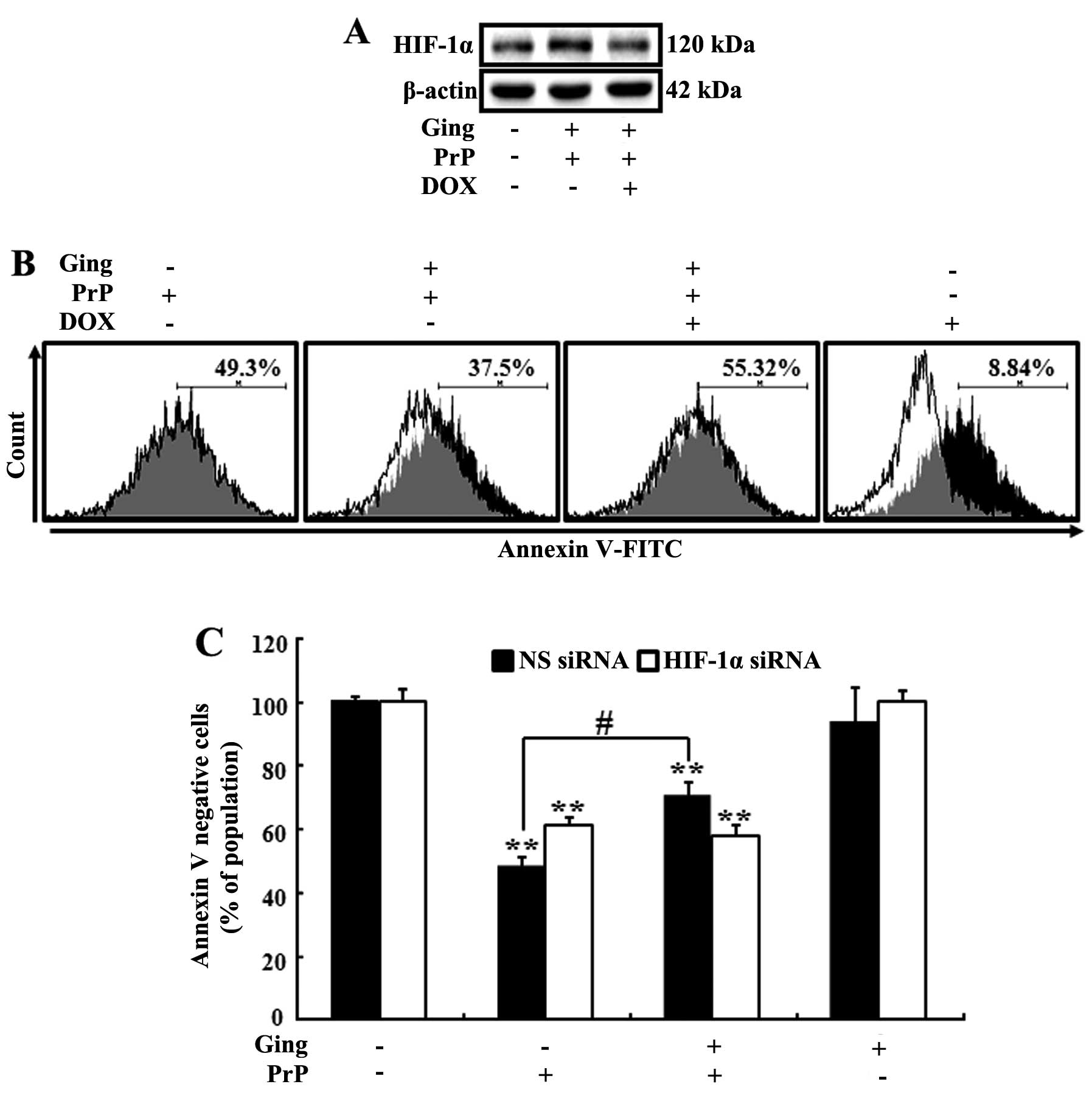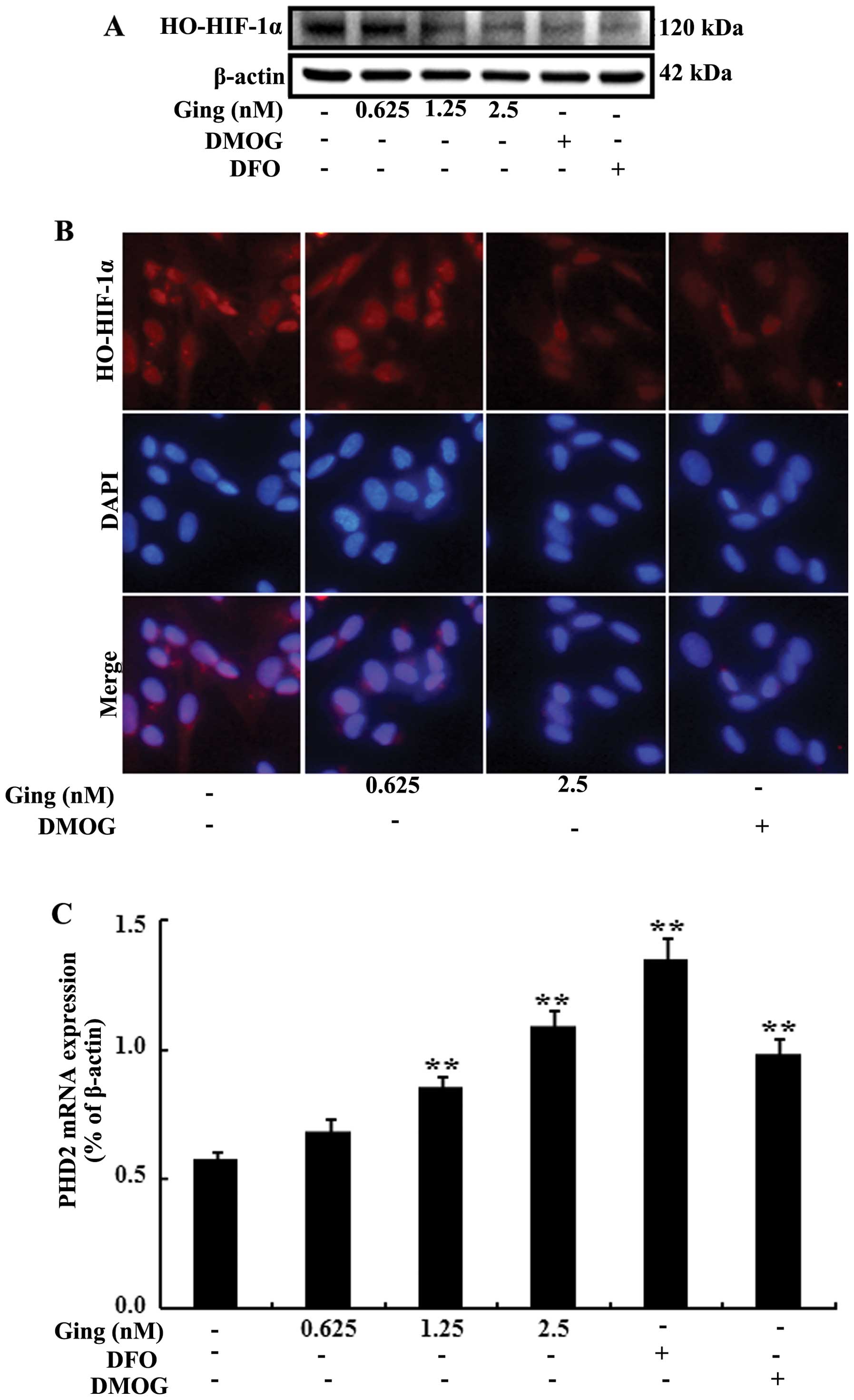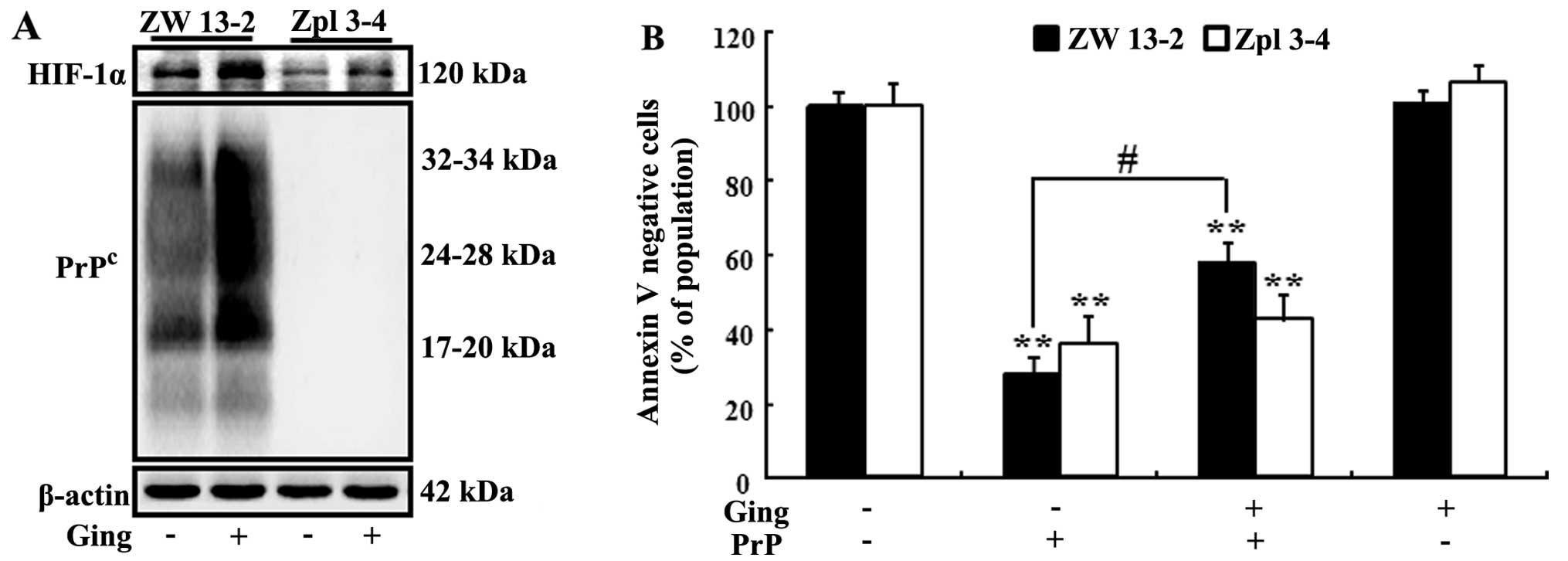|
1
|
Aguzzi A and Calella AM: Prions: protein
aggregation and infectious diseases. Physiol Rev. 89:1105–1152.
2009. View Article : Google Scholar : PubMed/NCBI
|
|
2
|
Solomon IH, Schepker JA and Harris DA:
Prion neurotoxicity: insights from prion protein mutants. Curr
Issues Mol Biol. 12:51–61. 2010.PubMed/NCBI
|
|
3
|
Sajnani G, Silva CJ, Ramos A, et al:
PK-sensitive PrP is infectious and shares basic structural features
with PK-resistant PrP. PLoS Pathog. 8:e10025472012. View Article : Google Scholar : PubMed/NCBI
|
|
4
|
Sakudo A and Ikuta K: Prion protein
functions and dysfunction in prion diseases. Curr Med Chem.
16:380–389. 2009. View Article : Google Scholar : PubMed/NCBI
|
|
5
|
Jeong JK, Moon MH, Bae BC, et al:
Autophagy induced by resveratrol prevents human prion
protein-mediated neurotoxicity. Neurosci Res. 73:99–105. 2012.
View Article : Google Scholar : PubMed/NCBI
|
|
6
|
Jeong JK, Moon MH, Lee YJ, Seol JW and
Park SY: Autophagy induced by the class III histone deacetylase
Sirt1 prevents prion peptide neurotoxicity. Neurobiol Aging.
34:146–156. 2013. View Article : Google Scholar : PubMed/NCBI
|
|
7
|
Aiken JM, Williamson JL and Marsh RF:
Evidence of mitochondrial involvement in scrapie infection. J
Virol. 63:1686–1694. 1989.PubMed/NCBI
|
|
8
|
Quintanilla RA, Dolan PJ, Jin YN and
Johnson GV: Truncated tau and Aβ cooperatively impair mitochondria
in primary neurons. Neurobiol Aging. 33:619.e625–619.e635.
2012.
|
|
9
|
Freixes M, Rodriguez A, Dalfo E and Ferrer
I: Oxidation, glycoxidation, lipoxidation, nitration, and responses
to oxidative stress in the cerebral cortex in Creutzfeldt-Jakob
disease. Neurobiol Aging. 27:1807–1815. 2006. View Article : Google Scholar
|
|
10
|
Jeong JK, Moon MH, Park YG, et al:
Gingerol-induced hypoxia-inducible factor 1 alpha inhibits human
prion peptide-mediated neurotoxicity. Phytother Res. 27:1185–1192.
2013. View
Article : Google Scholar : PubMed/NCBI
|
|
11
|
Xie L, Johnson RS and Freeman RS:
Inhibition of NGF deprivation-induced death by low oxygen involves
suppression of BIMEL and activation of HIF-1. J Cell Biol.
168:911–920. 2005. View Article : Google Scholar : PubMed/NCBI
|
|
12
|
O’Donovan CN, Tobin D and Cotter TG: Prion
protein fragment PrP-(106–126) induces apoptosis via mitochondrial
disruption in human neuronal SH-SY5Y cells. J Biol Chem.
276:43516–43523. 2001.
|
|
13
|
Forloni G, Angeretti N, Chiesa R, et al:
Neurotoxicity of a prion protein fragment. Nature. 362:543–546.
1993. View
Article : Google Scholar : PubMed/NCBI
|
|
14
|
Melo JB, Agostinho P and Oliveira CR:
Prion protein aggregation and neurotoxicity in cortical neurons.
Ann NY Acad Sci. 1096:220–229. 2007. View Article : Google Scholar : PubMed/NCBI
|
|
15
|
Sponne I, Fifre A, Koziel V, Kriem B,
Oster T and Pillot T: Humanin rescues cortical neurons from
prion-peptide-induced apoptosis. Mol Cell Neurosci. 25:95–102.
2004. View Article : Google Scholar : PubMed/NCBI
|
|
16
|
Lando D, Peet DJ, Gorman JJ, Whelan DA,
Whitelaw ML and Bruick RK: FIH-1 is an asparaginyl hydroxylase
enzyme that regulates the transcriptional activity of
hypoxia-inducible factor. Genes Dev. 16:1466–1471. 2002. View Article : Google Scholar : PubMed/NCBI
|
|
17
|
Dery MA, Michaud MD and Richard DE:
Hypoxia-inducible factor 1: regulation by hypoxic and non-hypoxic
activators. Int J Biochem Cell Biol. 37:535–540. 2005. View Article : Google Scholar : PubMed/NCBI
|
|
18
|
Madan A, Varma S and Cohen HJ:
Developmental stage-specific expression of the alpha and beta
subunits of the HIF-1 protein in the mouse and human fetus. Mol
Genet Metab. 75:244–249. 2002. View Article : Google Scholar
|
|
19
|
Ke Q and Costa M: Hypoxia-inducible
factor-1 (HIF-1). Mol Pharmacol. 70:1469–1480. 2006. View Article : Google Scholar : PubMed/NCBI
|
|
20
|
Jeong JK, Seo JS, Moon MH, Lee YJ, Seol JW
and Park SY: Hypoxia-inducible factor-1α regulates prion protein
expression to protect against neuron cell damage. Neurobiol Aging.
33:1006 e1001–1010. 2012.
|
|
21
|
Bruick RK: Oxygen sensing in the hypoxic
response pathway: regulation of the hypoxia-inducible transcription
factor. Genes Dev. 17:2614–2623. 2003. View Article : Google Scholar : PubMed/NCBI
|
|
22
|
Page EL, Chan DA, Giaccia AJ, Levine M and
Richard DE: Hypoxia-inducible factor-1alpha stabilization in
nonhypoxic conditions: role of oxidation and intracellular
ascorbate depletion. Mol Biol Cell. 19:86–94. 2008. View Article : Google Scholar : PubMed/NCBI
|
|
23
|
Groenman FA, Rutter M, Wang J, Caniggia I,
Tibboel D and Post M: Effect of chemical stabilizers of
hypoxia-inducible factors on early lung development. Am J Physiol
Lung Cell Mol Physiol. 293:L557–L567. 2007. View Article : Google Scholar : PubMed/NCBI
|
|
24
|
Dugasani S, Pichika MR, Nadarajah VD,
Balijepalli MK, Tandra S and Korlakunta JN: Comparative antioxidant
and anti-inflammatory effects of [6]-gingerol, [8]-gingerol,
[10]-gingerol and [6]-shogaol. J Ethnopharmacol. 127:515–520.
2010.
|
|
25
|
Masuda Y, Kikuzaki H, Hisamoto M and
Nakatani N: Antioxidant properties of gingerol related compounds
from ginger. Biofactors. 21:293–296. 2004. View Article : Google Scholar : PubMed/NCBI
|
|
26
|
Seo JS, Seol JW, Moon MH, Jeong JK, Lee YJ
and Park SY: Hypoxia protects neuronal cells from human prion
protein fragment-induced apoptosis. J Neurochem. 112:715–722. 2010.
View Article : Google Scholar : PubMed/NCBI
|
|
27
|
Yon JM, Baek IJ, Lee BJ, Yun YW and Nam
SY: Emodin and [6]-gingerol lessen hypoxia-induced embryotoxicities
in cultured mouse whole embryos via upregulation of
hypoxia-inducible factor 1alpha and intracellular superoxide
dismutases. Reprod Toxicol. 31:513–518. 2011.
|
|
28
|
Selvaggini C, De Gioia L, Cantu L, et al:
Molecular characteristics of a protease-resistant, amyloidogenic
and neurotoxic peptide homologous to residues 106–126 of the prion
protein. Biochem Biophys Res Commun. 194:1380–1386. 1993.PubMed/NCBI
|
|
29
|
Jeong JK and Park SY: Transcriptional
regulation of specific protein 1 (SP1) by hypoxia-inducible factor
1 alpha (HIF-1α) leads to PRNP expression and neuroprotection from
toxic prion peptide. Biochem Biophys Res Commun. 429:93–98.
2012.
|


















